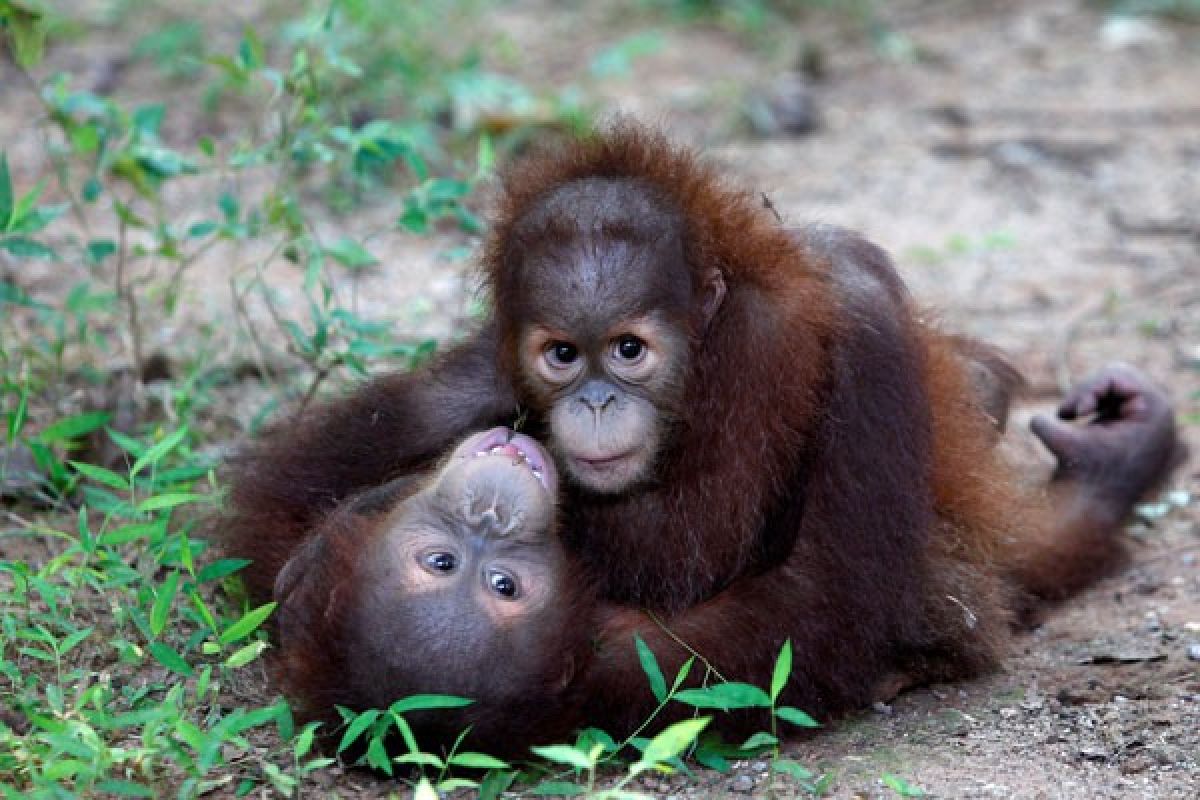According to a recent study, around 70 percent of orangutan habitats are in an extremely vulnerable state, because they are located outside conservation areas, a fact that can threaten the primate`s preservation.Jakarta (ANTARA News) - Environmental crimes such as illegal logging and conversion of rain forests into oil palm plantations are putting high pressure on ecosystems and the population of Bornean Orangutan, "Pongo pygmaeus morio".
Illegal logging, land-clearing and conversion activities are considered to be the greatest threats to the "Heart of Borneo". Of particular concern is the conversion of natural forests to oil palm and timber plantations.
As in many tropical areas around the world, Kalimantan rain forests are being cut and degraded for timber, palm oil, pulp, rubber and minerals, and as a result, the orangutan population continues to decline to near extinction.
The results of a recent survey by the orangutan conservation agency, the Center for Orangutan Protection (COP) in Samarinda, East Kalimantan, noted that the orangutan population in the Lesan River Protected Forest (HLSL) continues to decline year by year.
COP is a non-governmental organization that focuses on orangutan preservation and protection in Indonesia, including those in East Kalimantan.
With an area of 13,565 hectares, the Lesan River Protected Forest is an important habitat for orangutans and a variety of rare and legally protected wildlife such as sun bears (Helarctos malayanus) and clouded leopard (Neofelis nebulosa), according to COP Habitat Protection Program Manager Ramadhani.
However, conservation efforts are sabotaged by palm oil companies, so the forested areas that should be the connecting corridors between HLSL and other orangutan habitats are running out.
Hence, Ramadhani asserted that very serious efforts must be taken to maintain the remaining population of Bornean Orangutan.
Local residents has found a male orangutan, aged between five and seven years, in critical condition in Teluk Pandan Village of East Kutai District, but the animal then died on Tuesday after being treated by Kutai National Park in Bontang.
The body of the orangutan was moved from the national park on Sunday to the city of Bontang for an autopsy.
During the autopsy conducted at the Pupuk Kaltim Hospital in Bontang city on Wednesday, the authority removed 48 bullets from the body of a dead orangutan.
Ramadhani noted in a statement that an x-ray showed the presence of some 130 bullets in the body of the dead orangutan, but the autopsy team managed to remove only some of them.
"The autopsy has run for four hours, and 48 bullets were removed from the body," Ramadhani remarked.
The autopsy was conducted by the Bontang police and local officials of the Forestry and Environment Ministry.
The bullets were fired all across the orangutan`s body, and 74 bullets were found in the head. The rest hit his arms, legs, and chest.
In addition, the team also found several wounds and some 19 new injuries allegedly caused by sharp objects.
Ramahdani said the orangutan allegedly died of inflammation from his old and new injuries.
In May 2016, a similar case had occurred not far from the current location, but the case remained unsolved until now.
Therefore, the Center for Orangutan Protection will work in coordination with the police and environment ministry to solve this case.
Environment and Forestry Minister Siti Nurbaya has said the government would not hesitate to crack down on the perpetrators of the massacre of orangutans.
"We are legally pushing for cases to be processed by law," Nurbaya said to respond to the a carcass of a headless Bornean orangutan found floating in Kalahien River in South Barito, Central Kalimantan on January 15, 2018.
The environment and forestry minister affirmed that the massacre of protected animals, including the Bornean orangutan, is not justified for any reason, so the offender must be prosecuted and punished according to the rules.
Nyaru Menteng Borneo Orangutan Survival Foundation (BOSF) has expressed its regret over the discovery of the Bornean orangutan carcass, which was full of wounds from sharp objects, in the Kalahien River.
From the scars all over the bodies of the orangutan, it was evident that the protected animal had died from conflict with humans, according to Nyaru Menteng BOSF Public Relations official, Monterado Friedman, in Palangkaraya, Central Kalimantan.
Further, Friedman remarked that the Nyaru Menteng BOSF strongly condemned the human actions that resulted in the death of the Bornean orangutan.
The orangutan is the only great ape that exists outside Africa and has been listed as an endangered species. Three other species of apes, namely the gorilla; the chimpanzee, or Pan Troglodytes; and the Bonobo, or Pan Panicus; are all found only in Africa.
Two types of orangutans are found living in Indonesia. These have been identified as the Bornean orangutan, or the Pongo pygmaeus, and the Sumatran orangutan, or the Pongo Abelii, but they have been classified as critically endangered.
According to a recent study, around 70 percent of orangutan habitats are in an extremely vulnerable state, because they are located outside conservation areas, a fact that can threaten the primate`s preservation.
In its efforts to save the protected species from extinction, the BOSF is keen to release as many Bornean orangutans as possible into their natural habitat.
In cooperation with the Central Kalimantan Natural Resources Conservation Agency (BKSDA), the BOSF last year had released 12 orangutans into the Bukit Baka National Park in Katingan District.
(T.O001/A/KR-BSR/A/H-YH)
Reporter: Otniel Tamindael
Editor: Heru Purwanto
Copyright © ANTARA 2018












